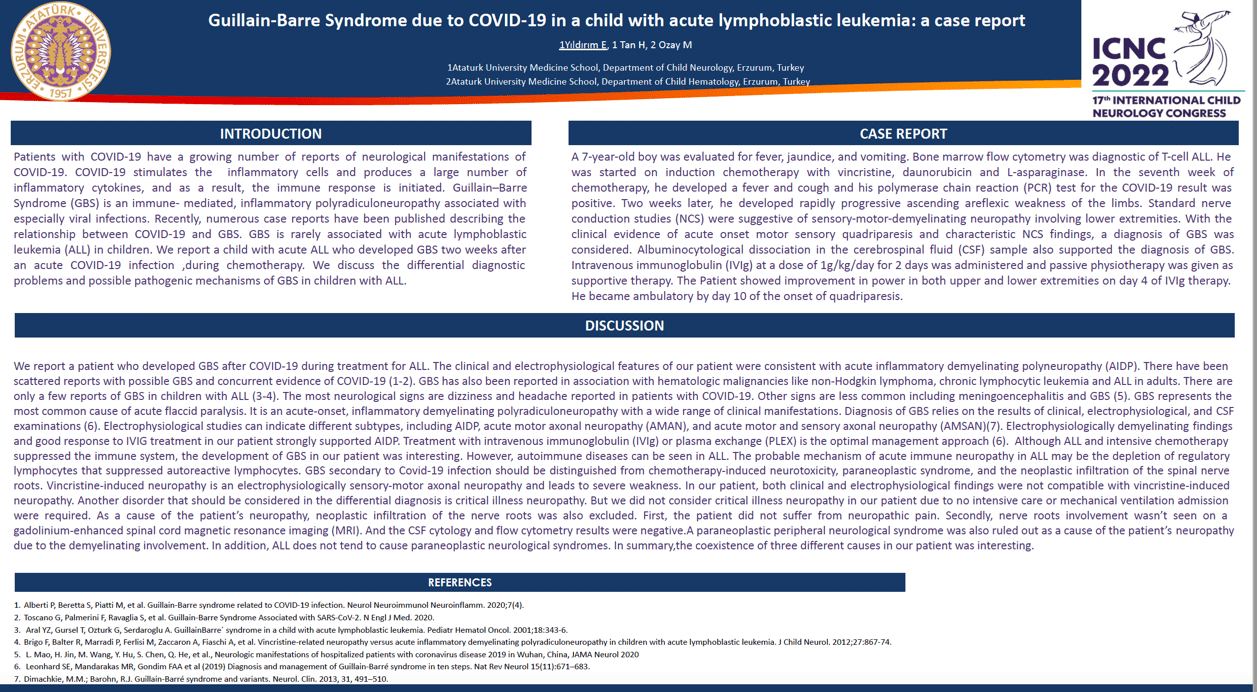Guillain–Barre Syndrome due to COVID 19 in a child with acute lymphoblastic leukemia: a case report
HUSEYIN TAN, ELIF YILDIRIM, MUSTAFA OZAY
Patients with COVID-19 typically have fever and respiratory illness; however, a wide range of other symptoms have been described. There are a growing number of reports of neurological manifestations of COVID-19. COVID-19 stimulates the inflammatory cells and produces a large number of inflammatory cytokines, and as a result, the immune response is initiated. Guillain–Barre Syndrome (GBS) is an immune-mediated, inflammatory polyradiculoneuropathy associated with especially viral infections. Recently, numerous case reports have been published describing the relationship between COVID-19 and GBS. GBS is rarely associated with acute lymphoblastic leukemia (ALL) in children. We report a child with acute ALL who developed GBS two weeks after an acute COVID-19 infection. The improvement was favorable after intravenous immunoglobulins. GBS secondary to Covid-19 infection should be distinguished from chemotherapy-induced neurotoxicity, paraneoplastic syndrome, and the neoplastic infiltration of the spinal nerve roots. We discuss the differential diagnostic problems and possible pathogenic mechanisms of GBS in children with ALL.
Keywords: COVID-19,GBS,ALL
HUSEYIN TAN
Ataturk University Faculty of Medicine
Turkey
ELIF YILDIRIM
Ataturk University Faculty of Medicine
Turkey
MUSTAFA OZAY
Ataturk University Faculty of Medicine
Turkey
Patients with COVID-19 typically have fever and respiratory illness; however, a wide range of other symptoms have been described. There are a growing number of reports of neurological manifestations of COVID-19. COVID-19 stimulates the inflammatory cells and produces a large number of inflammatory cytokines, and as a result, the immune response is initiated. Guillain–Barre Syndrome (GBS) is an immune-mediated, inflammatory polyradiculoneuropathy associated with especially viral infections. Recently, numerous case reports have been published describing the relationship between COVID-19 and GBS. GBS is rarely associated with acute lymphoblastic leukemia (ALL) in children. We report a child with acute ALL who developed GBS two weeks after an acute COVID-19 infection. The improvement was favorable after intravenous immunoglobulins. GBS secondary to Covid-19 infection should be distinguished from chemotherapy-induced neurotoxicity, paraneoplastic syndrome, and the neoplastic infiltration of the spinal nerve roots. We discuss the differential diagnostic problems and possible pathogenic mechanisms of GBS in children with ALL.
Keywords: COVID-19,GBS,ALL
HUSEYIN TAN
Ataturk University Faculty of Medicine
Turkey
ELIF YILDIRIM
Ataturk University Faculty of Medicine
Turkey
MUSTAFA OZAY
Ataturk University Faculty of Medicine
Turkey

HUSEYIN TAN
Ataturk University Faculty of Medicine
Turkey
Ataturk University Faculty of Medicine
Turkey